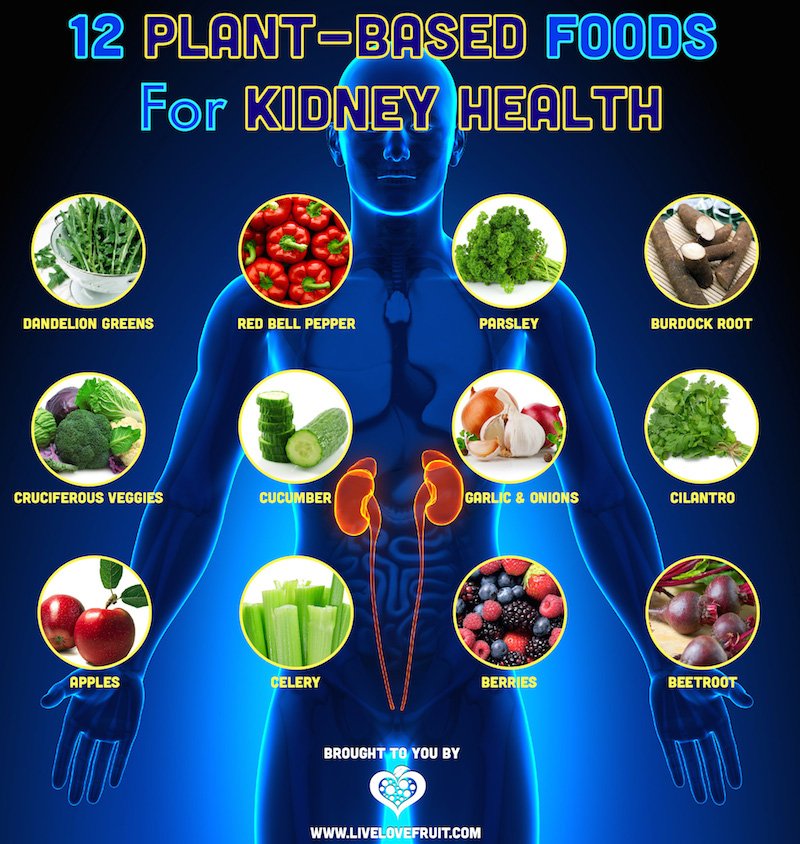Healthy Foods for Kidney Health

Why is Diet Important for Kidney Health?
The kidneys are vital organs that play a key role in maintaining overall health. They filter waste and excess fluids from the blood, helping to maintain a healthy balance of fluids and electrolytes in the body. A healthy diet is important for kidney health because it can help to prevent the buildup of waste and excess fluids in the blood, which can lead to kidney damage and disease over time.
What are Healthy Foods for Kidney Health?
A healthy diet for kidney health should include a variety of nutrient-rich foods, such as:
1. Fruits and Vegetables
Fruits and vegetables are rich in vitamins, minerals, and antioxidants that can help to protect the kidneys from damage. Some of the best choices include:
- Berries
- Apples
- Oranges
- Leafy Greens
- Broccoli
- Cauliflower
These foods are also low in potassium, which is important for people with kidney disease.
2. Whole Grains
Whole grains are a good source of fiber, which can help to lower cholesterol and reduce the risk of heart disease. Some healthy options include:
- Brown Rice
- Quinoa
- Whole Wheat Bread
- Oatmeal
3. Lean Protein
Protein is important for building and repairing tissues in the body, but it can also be hard on the kidneys. Choosing lean sources of protein, such as:
- Chicken
- Turkey
- Fish
- Eggs
- Beans
can help to reduce the workload on the kidneys.
4. Healthy Fats
Healthy fats, such as those found in:
- Nuts
- Seeds
- Olive Oil
- Avocado
can help to reduce inflammation and protect the kidneys from damage.
What Foods Should You Avoid for Kidney Health?
When it comes to maintaining kidney health, there are some foods that should be avoided or limited, such as:
1. Processed Foods
Processed foods are often high in sodium, which can increase blood pressure and put a strain on the kidneys. Some examples include:
- Canned Soups
- Fast Food
- Packaged Snacks
- Processed Meats
2. High-Potassium Foods
For people with kidney disease, it's important to limit foods that are high in potassium, such as:
- Bananas
- Oranges
- Potatoes
- Tomatoes
- Spinach
3. High-Phosphorus Foods
High-phosphorus foods should also be limited for people with kidney disease, such as:
- Dairy Products
- Nuts and Seeds
- Sodas
- Processed Meats
4. Sugary Foods and Beverages
Sugary foods and beverages can contribute to obesity and diabetes, which are risk factors for kidney disease. Some examples include:
- Soda
- Candy
- Cakes and Cookies
- Sweetened Yogurt
Benefits of Eating a Healthy Diet for Kidney Health
Eating a healthy diet can provide a range of benefits for kidney health, including:
- Reducing the risk of kidney damage and disease
- Lowering blood pressure
- Reducing the risk of heart disease
- Preventing the buildup of waste and excess fluids in the blood
- Reducing inflammation
FAQs
1. Can drinking more water improve kidney health?
Yes, drinking more water can help to improve kidney health by flushing waste and toxins from the body. However, people with kidney disease should talk to their doctor about how much water is safe for them to drink.
2. Is a low-protein diet necessary for kidney health?
For people with kidney disease, a low-protein diet may be recommended to reduce the workload on the kidneys. However, for people with healthy kidneys, a moderate amount of protein is important for overall health.
3. Can certain supplements improve kidney health?
Some supplements, such as vitamin D and omega-3 fatty acids, may be beneficial for kidney health. However, it's important to talk to a doctor before taking any supplements, as they can interact with medications and have side effects.
4. How can I tell if I have kidney disease?
Some symptoms of kidney disease include:
- Swelling in the legs, ankles, or feet
- Feeling tired or weak
- Changes in urination (more or less than usual, foamy or dark urine)
- High blood pressure
- Nausea or vomiting
If you experience any of these symptoms, it's important to talk to a doctor.
Conclusion
A healthy diet is essential for maintaining kidney health. By eating a variety of nutrient-rich foods and limiting processed foods, high-potassium foods, high-phosphorus foods, and sugary foods and beverages, you can help to protect your kidneys from damage and disease. Talk to your doctor if you have any concerns about your kidney health or if you experience any symptoms of kidney disease.
